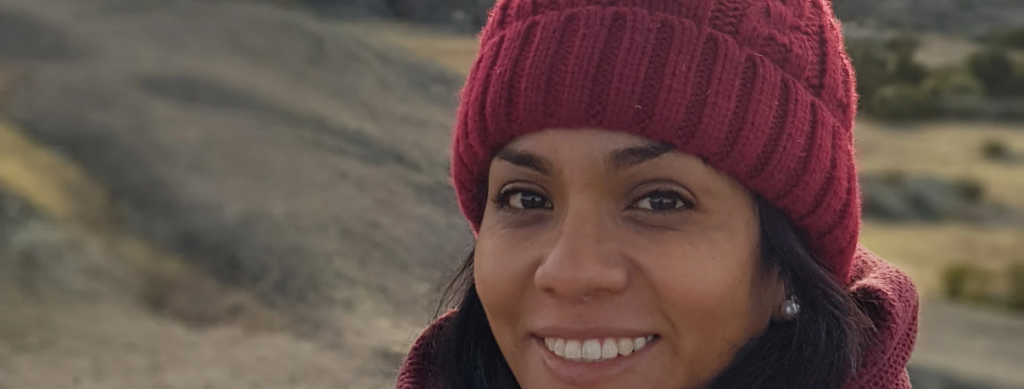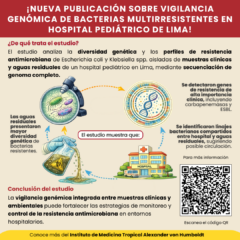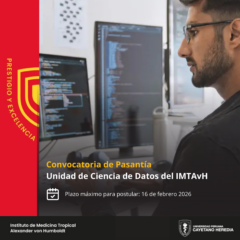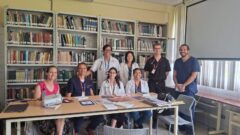Dra Francesca Falconi – Entrevista Institute of Tropical Medicine Antwerp

Francesca Falconi With a Master’s degree in Biochemistry and Molecular Biology and extensive knowledge of avian diseases and leishmania, Francesca is an expert in the field of immunology, particularly with regards to antibodies and diagnostic tests. She further honed her skills as a pre-doctoral researcher at the Instituto de Medicina Tropical Alexander von Humboldt in Lima, where she was involved in collaborations with the Institute of Tropical Medicine (ITM). In 2018, she embarked on a new challenge and began her PhD programme, exploring the emerging field of arboviruses such as dengue, Zika and chikungunya under the guidance of Kevin Ariën, the Head of ITM’s Unit of Virology. Her PhD programme was funded by ITM’s fourth framework agreement with the Directorate-general for Development Cooperation and Humanitarian Aid.
Investigar, innovar y crear es el mejor camino para alcanzar el éxito.
¡Nuestra querida investigadora Francesca Falconi Agapito de la Unidad de Investigación en Virología, es un ejemplo de esto!
Compartimos la entrevista realizada por el Institute of Tropical Medicine Antwerp
Interview with Peruvian scientist and ITM PhD alumna Francesca Falconi
Francesca Falconi
With a Master’s degree in Biochemistry and Molecular Biology and extensive knowledge of avian diseases and leishmania, Francesca is an expert in the field of immunology, particularly with regards to antibodies and diagnostic tests. She further honed her skills as a pre-doctoral researcher at the Instituto de Medicina Tropical Alexander von Humboldt in Lima, where she was involved in collaborations with the Institute of Tropical Medicine (ITM). In 2018, she embarked on a new challenge and began her PhD programme, exploring the emerging field of arboviruses such as dengue, Zika and chikungunya under the guidance of Kevin Ariën, the Head of ITM’s Unit of Virology. Her PhD programme was funded by ITM’s fourth framework agreement with the Directorate-general for Development Cooperation and Humanitarian Aid.
Interview
Meet Francesca Falconi, a Peruvian scientist and PhD alumna of ITM. Despite facing unexpected setbacks in her research, such as stolen blood samples and a global pandemic, Francesca persevered and earned her doctoral degree on time. We spoke with her about her passion for arboviruses, her research on developing diagnostic tools for low-resource settings, and the importance and challenges of field work.
First things first. Why arboviruses?
In Latin America, arboviruses are one of the most common causes of acute febrile illness. They pose a significant health problem all over the continent, but disproportionally affect low- and middle-income countries such as Peru. The viruses are transmitted by mosquitoes, ticks and sand flies and cause illnesses such as dengue, chikungunya, yellow fever, and Zika. In the Americas, laboratory identification of dengue, the most prevalent arbovirus in the region occurs in less than 50% of cases, leading to major underdiagnoses.
What was your PhD research about?
The illnesses caused by arboviruses are very hard to diagnose on clinical symptoms alone, because they all present similarly: with a fever and headache. Besides, there are very few reference laboratories in Peru performing diagnostic tests for arboviruses, so samples have to travel far to get tested. On top that, the available antibody-based tests, which are simpler and easier to deploy in low-resource settings, are not accurate. That is why I wanted to identify a new generation of biomarkers with my research, to be able to develop new diagnostic tests which can detect arboviruses more specifically. This would provide a major step forward for health care centres for treatment, but also for the government’s disease control measures as those are based on the official number of cases.
How did you experience field work?
My field work began in 2018 and I had to set up collection sites from scratch. This meant establishing personal contacts at hospitals in different regions in the country: at the coast, in the rainforest, in the south. In that first year I spent half of my time on the road. But it paid off: I’ve built a network of hospitals all around the country, which is crucial for further research. It was also a humbling experience to work with the affected communities, and field work gave me a fuller understanding of my subject matter.

Technician Daniel Wong in Quistococha, Iquitos during sample collection
What were the specific challenges you faced?
There were many (laughs)! First of all, in 2017, a major dengue outbreak took place in northern of Peru, where most cases occur. Because of that, serious control measures against mosquitoes were deployed across the country, which then resulted in a very low number of cases in 2018, just when I started collecting my samples. This gave me mixed feelings because it was of course good for the affected populations, but bad for my project. However, I knew it was only a transitory effect and new outbreaks will follow in the future.
Secondly, we had to collect three samples from the same patients over the course of about a year. The first one in the acute phase of their illness, the second after 3 months, and a third after another 3 months. But once the people were healthy again, they became harder to convince to keep giving samples and participate in our study as they did not see the point anymore.
We also had many logistical challenges. Travelling in the remote areas was not just time-consuming; all the samples had to be shipped back to Lima for laboratory testing, which was very expensive. And once, after the third collection trip, my samples simply got stolen from the transporting truck. I could not believe that something like this would happen. I needed to return and collect the samples all over again. And then of course there was the COVID-19 epidemic, at the onset of which I was in Antwerp to report on my PhD progress to my supervisors. I ended up being stranded for months until I could get on a repatriation flight. Luckily, by that time I was mostly analysing data, so did not lose a lot of time. But my trajectory was very eventful, to stay the least (laughs)! Having the support of my supervisors, friends and family helped me to navigate through it.
You defended your PhD in June last year, and you are now a postdoctoral researcher at IMTAvH. What are you working on at the moment?
Now I am the principal investigator of the KUNASA project. Kunasa means “what is it?” in Aymara, a native language in Peru. In this project, together with a private company, we are trying to establish a biobank of samples and identify markers for severe dengue. And with ITM, the project aims to alleviate the underdiagnosis problem of arboviruses through approaches applicable in low-resource settings: one is validating a highly sensitive, real-time PCR machine for the simultaneous testing of four different arboviruses. This machine requires very little training for staff who operate it. Secondly, we aim to discover other viruses causing febrile illness in the Peruvian Amazon through next-generation sequencing. We have seen that about 60% of febrile patients remain negative for the tested arboviruses, and we want to find out what other pathogens are causing the illness. There are already several new publications lined up for the first half of this year that we collaborated on with ITM virologists.
I am happy to see that there is another PhD student now at ITM, who is doing a follow-up study on my research with already very promising results. Transferring knowledge to her is a delight.
And what are your plans for the future?
To become a well-known researcher in arboviruses in Latin America!
Información recopilada de la web de Institute of Tropical Medicine Antwerp
Sigue las redes de Institute of Tropical Medicine Antwerp para conocer sus actividades y noticias





